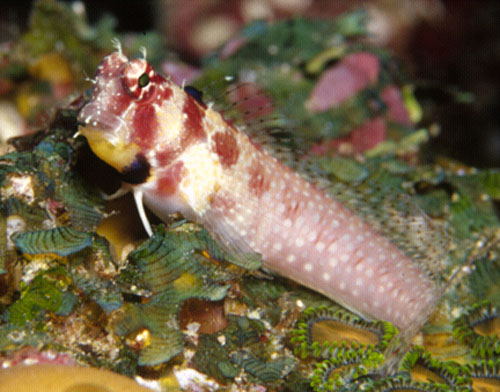| Blenniidae (Combtooth blennies), subfamily: Salariinae |
| 10 cm TL (male/unsexed) |
|
reef-associated; depth range 1 - 25 m |
| Western Pacific: east to Tonga. |
|
Dorsal spines (total): 12-12; Dorsal soft rays (total): 16-18; Anal spines: 2-2; Anal soft rays: 18-20. Dorsal fin spines elongate, extending beyond membrane. Terminal anal ray connected by membrane to caudal peduncle. Gill opening narrow and restricted, slightly below the level of the ventralmost pectoral ray. Some preopercular and mandibular pores with cirri. A black, fleshy flap at the base of the 1st dorsal spine. A black blotch is present ventrally on each side of the head. |
| Adults are found in seaward reefs (Ref. 9710). Also inhabit shallow, semi-exposed, hard-coral and rock reef with rich algae growth (Ref. 48636). Oviparous. Eggs are demersal and adhesive (Ref. 205), and are attached to the substrate via a filamentous, adhesive pad or pedestal (Ref. 94114). Larvae are planktonic, often found in shallow, coastal waters (Ref. 94114). |
|
(Ref. 96402)
|
| harmless |
|
Also Ref. 48636. |
Source and more info: www.fishbase.org. For personal, classroom, and other internal use only. Not for publication.
Page created by Jen, 05.08.02,
php script by kbanasihan 06/09/2010 ,
last modified by
dsantos, 20/08/10

